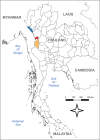Malaria control among Myanmar migrants in Thailand: a qualitative study of healthcare providers
- PMID: 40405144
- PMCID: PMC12096533
- DOI: 10.1186/s12936-025-05397-4
Malaria control among Myanmar migrants in Thailand: a qualitative study of healthcare providers
Abstract
Background: Thailand has experienced a recent surge in malaria cases, particularly along the Thailand-Myanmar border, likely driven by the importation of infections by Myanmar migrants. Implementing malaria control measures, especially surveillance among these high-risk populations, presents significant challenges. This study aimed to identify key obstacles and propose targeted solutions for enhancing malaria control among Myanmar migrants in border areas of Thailand.
Methods: A cross-sectional qualitative study was conducted in early 2024. Semi-structured interviews were held with 20 government healthcare providers and village health volunteers involved in malaria control across three districts in western Thailand with the highest malaria caseloads. Data were analysed using thematic analysis.
Results: Respondents consistently linked the rise in malaria cases to increased cross-border migration from Myanmar following recent political unrest. Key challenges included difficulty locating and following up with short-term or undocumented migrants, language barriers that hinder health education, and delays in diagnosis because of limited infrastructure and reliance on rapid diagnostic tests in areas without electricity. Suggested solutions included deploying mobile malaria posts near informal border crossings, mandating malaria testing before worksite entry, and engaging local employers and community leaders to register new arrivals and support treatment adherence among migrants.
Conclusions: Ongoing political instability in Myanmar continues to drive a large and dynamic population of migrants into Thailand's border regions, sustaining malaria importation and complicating elimination efforts. Tailored, migrant-responsive strategies, such as mobile surveillance near border crossings, community-based follow-up mechanisms, and infrastructure improvements, are urgently needed to close coverage gaps and achieve malaria elimination by 2030.
Keywords: Border; Challenges; Malaria; Migrants; Myanmar; Surveillance; Thailand.
© 2025. The Author(s).
Conflict of interest statement
Declarations. Ethics approval and consent to participate: The study protocol was reviewed and approved by the Ethics Committee for Human Research Study, Faculty of Tropical Medicine, Mahidol University, Bangkok, Thailand (MUTM 2023–091-01). Informed consent forms were signed by all respondents prior to the interviews. Consent for publication: Not applicable. Competing interests: The authors declare no competing interests.
Figures
Similar articles
-
Demographic and socioeconomic obstacles to access to malaria services for Myanmar migrants in Thailand.Malar J. 2024 Aug 11;23(1):239. doi: 10.1186/s12936-024-05066-y. Malar J. 2024. PMID: 39128989 Free PMC article.
-
Giving birth on the way to the clinic: undocumented migrant women's perceptions and experiences of maternal healthcare accessibility along the Thailand-Myanmar border.Reprod Health. 2023 Dec 6;20(1):178. doi: 10.1186/s12978-023-01722-9. Reprod Health. 2023. PMID: 38057915 Free PMC article.
-
Respondent-driven sampling on the Thailand-Cambodia border. I. Can malaria cases be contained in mobile migrant workers?Malar J. 2011 May 10;10:120. doi: 10.1186/1475-2875-10-120. Malar J. 2011. PMID: 21554744 Free PMC article.
-
[Malaria elimination strategy and joint prevention and control of malaria across China-Myanmar border areas: an overview].Zhongguo Xue Xi Chong Bing Fang Zhi Za Zhi. 2025 Feb 27;37(1):19-23. doi: 10.16250/j.32.1915.2024281. Zhongguo Xue Xi Chong Bing Fang Zhi Za Zhi. 2025. PMID: 40235373 Review. Chinese.
-
Development of Malaria Digital Archives in Myanmar Through Official Development Assistance and Their Narrative Review.Pathogens. 2025 May 14;14(5):481. doi: 10.3390/pathogens14050481. Pathogens. 2025. PMID: 40430801 Free PMC article. Review.
Cited by
-
Malaria and determinants of health: a scoping review of malaria vulnerabilities in Southeast Asia.Trop Med Health. 2025 Aug 4;53(1):105. doi: 10.1186/s41182-025-00784-8. Trop Med Health. 2025. PMID: 40760710 Free PMC article. Review.
References
-
- WHO. World malaria report 2023. Geneva: World Health Organization; 2023.
MeSH terms
Grants and funding
LinkOut - more resources
Full Text Sources
Medical




